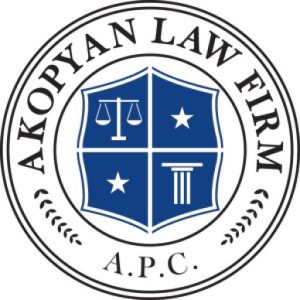Banning Employment Attorneys
The trial attorneys of the Akopyan Law Firm A.P.C. stand ready to fight for both employers and employees in Banning, California.
 Banning, California
Banning, California
Banning is a city located in Riverside County. Banning is home to roughly 30,000 residents. It covers approximately twenty three square miles, and encompasses the following zip code: 92220. The City of Banning is situated in the San Gorgonio Pass and has always been a strong location for economic development dating back to the days of the gold rush. By 1824, the San Gabriel Mission Fathers established a branch of the Mission at the highest point in the Pass, along the foothills northwest of Banning, where they raised cattle, sheep and pursued land cultivation. By that time, the area was known as Rancho San Gorgonio, so named by the padres after Street Gorgonio, A Latin martyr. The first white man to reach the area was Dr. Isaac Smith in 1853 who, according to recorded land documents, purchased from Paulino Weaver an undivided 1-third interest from the Mexican Governor, Pio Pico. Dr. Smith brought his wife and 7 children to the rancho to live and built a house known as Smith’s Station, which later became Highland Home and subsequently called Highland Springs. The following year, Banning’s first permanent landmark, Gilman Ranch adobe, was built. It was ultimately used as a stage stop by the Colorado Stage & Express Line founded by Alexander & Co. of Los Angeles on its route to the Colorado River in 1862, where gold had been discovered. Gilman’s Ranch just north of downtown Banning served as a station for the stagecoach lines that were headed to the gold boomtowns. Later, the railroad became a major contributor to the area’s growth. The town of Banning was incorporated on February 6, 1913 and was named after Phineas Banning, a stagecoach line owner and the “Father of the Port of Los Angeles.” Between 1930 and 1940 a new economic development emerged. The Metropolitan Water District planned to build an Aqueduct system. The plan was to drill a 26 foot in diameter hole through a13 mile section of the San Jacinto Mountains. Beginning in Cabazon and exit below Gilman Hot Springs. This was the largest and most significant engineering project ever to affect the San Gorgonio Pass area and led to a massive boom in commerce and the local economy. Subsequently, between 1940 and 1960 Banning’s population tripled in size. Today, the City is committed to a growing Banning, and maintains a business-friendly approach to economic development.
The Best Employment Lawyers in Banning
Banning, with its strategic location, offers its residents an array of choices when it comes to legal services. The legal landscape here is teeming with numerous lawyers and law firms, each vying for attention and clients. In fact, some legal practitioners might go to great lengths, even breaking down your door just to make a sales pitch. However, for both employers and employees in Banning facing serious legal issues, particularly those involving employment law, the challenge lies in discerning which lawyer is the right fit for their needs. This task can be further complicated by the constant barrage of gimmicky radio ads and the sight of cheesy posters plastered on billboards, buses, and street benches. While many individuals turn to the internet for guidance, even an online search for “Banning employment lawyer” or “wrongful termination attorney in Banning” often yields results inundated with paid advertisements from billboard lawyers. It’s essential to recognize that while a billboard lawyer may be suitable for certain cases, there are instances that demand the highest caliber of quality representation, provided by seasoned legal professionals. At the Akopyan Law Firm, A.P.C., each of our attorneys boasts nearly two decades of experience. They have built a solid track record of success in advocating for the rights and interests of both employers and employees. Our firm’s ethos centers on quality, emphasizing the meticulous representation of our clients rather than the pursuit of quantity. Our lawyers are more inclined to spend their time in the courtroom, fiercely fighting for the rights of our clients, rather than recording catchy radio advertisements in a studio. We don’t expect you to take our word for it; we’re more than willing to provide client references upon your request. Moreover, you can peruse our online reviews to gain insight into our clients’ experiences. With offices strategically located in Los Angeles, Bakersfield, Oxnard, Temecula, Rancho Cucamonga, Costa Mesa, Culver City, and San Diego, the Akopyan Law Firm A.P.C. is just minutes away from Banning. Our employment lawyers are primed and prepared to deliver world-class legal services and top-notch representation to the residents of Banning. When you need seasoned professionals who will champion your cause with dedication and expertise, we stand ready to serve you.
We Can Help Banning Residents With:
Featured Article:
When Major Pay, Hours, or Job Duty Changes May Be Treated as Constructive Discharge in California
📌 Key Takeaways Significant negative changes to pay, hours, schedule, or job duties—especially after an employer learns of a worker’s disability or qualifying medical condition, medical restrictions, or a request for reasonable accommodation—may support a constructive discharge analysis under California employment law, depending on the facts. A resignation may be treated as involuntary if an employer creates or allows working conditions that become objectively and subjectively intolerable, and the worker resigns because of those conditions. Sudden loss of overtime, deep hour cuts, or reassignment to a lower-paying position after medical disclosure or an accommodation request may be relevant to whether an employer applied financial pressure tied to protected status or protected activity. Schedule changes—such as rotating graveyard shifts, split shifts, or constantly changing start times—can matter when they interfere with treatment and recovery and begin after the employer receives medical restrictions or an accommodation request. Assigning duties that conflict with known medical restrictions may raise issues under disability-discrimination and reasonable-accommodation principles, including whether the employer engaged in the interactive process in good faith. Documentation often matters, including pay records, time sheets, job descriptions, written medical restrictions, and communications about scheduling, duties, and complaints. ~ ~ ~ ~ ~ ~ ~ ~ ~ ~ ~ ~ ~ ~ ~ ~ ~ ~ In California, resignation is not always treated as purely voluntary. In some situations, significant negative changes to pay, hours, scheduling, or job duties may be analyzed under the doctrine of constructive discharge. In general terms, constructive discharge is alleged when an employer’s actions (or failure to act) create working conditions that are so intolerable that a reasonable person would feel compelled to resign, and the worker actually resigns because of those conditions. Courts typically evaluate constructive discharge based on the totality of circumstances, including the severity of the conditions, whether the resignation was caused by those conditions, and whether the employer caused or failed to remedy the conditions. When Working Conditions May Support a Constructive Discharge Claim Many workers describe resigning only after conditions changed in ways that made continued employment unrealistic. For example, a worker may return after an injury to frequent schedule changes, more physically demanding assignments, and reduced income. Another worker may provide medical restrictions and then experience increased scrutiny, disciplinary write-ups, or job reassignments shortly afterward. A key issue is not simply whether the worker resigned. The issue is whether the employer’s conduct (or lack of corrective action) created conditions that could be argued to be intolerable and effectively left the worker with no reasonable alternative but to resign. Major Pay Changes That May Increase Pressure to Resign Sharp reductions in earnings may be relevant in a constructive discharge analysis, particularly when they follow an employer’s awareness of a worker’s disability or qualifying medical condition, medical restrictions, or a request for reasonable accommodation. Examples may include: Loss of overtime that a worker previously relied on, beginning soon after the worker submits medical restrictions or requests an accommodation. Deep reductions in scheduled hours that significantly... Read more









Millions of Dollars Recovered For Our Clients
Check Out Our Case Results



